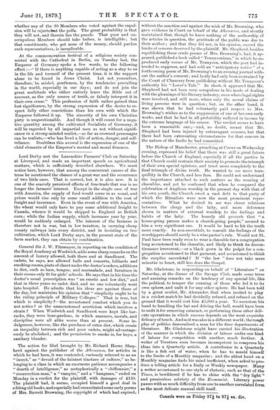General Sir J. W. Fitzmayer, in reporting on the condition
of the Royal Academy at Woolwich, adds some sharp remarks on the amount of luxury allowed, both there and at Sandhurst. The cadets, he says, are allowed balls and concerts, billiards and smoking-rooms, pints of claret under the doctor's orders, additions to diet, such as ham, tongue, and marmalade, and furniture in -their rooms only fit for girls' schools. He says that in his time the doctor's usual prescription was " an emetic and low diet," and that in three years no cadet died, and no one voluntarily went into hospital. He admits that his ideas are against those of the day, but maintains his opinion that " simplicity ought to be the ruling principle of Military Colleges." That is true, but which is simplicity P—the accustomed comfort which you do not notice ? or the unaccustomed asceticism which involves a strain ? When Woolwich and Sandhurst were kept like bar- racks, they were bear-gardens, in which manners, morals, and discipline were all alike worse than at present. Some in- dulgences, however, like the purchase of extra diet, which create an inequality between rich and poor cadets, might advantage- ously be abolished ; and the permission to smoke is, for boys, a sanitary blunder.


































 Previous page
Previous page